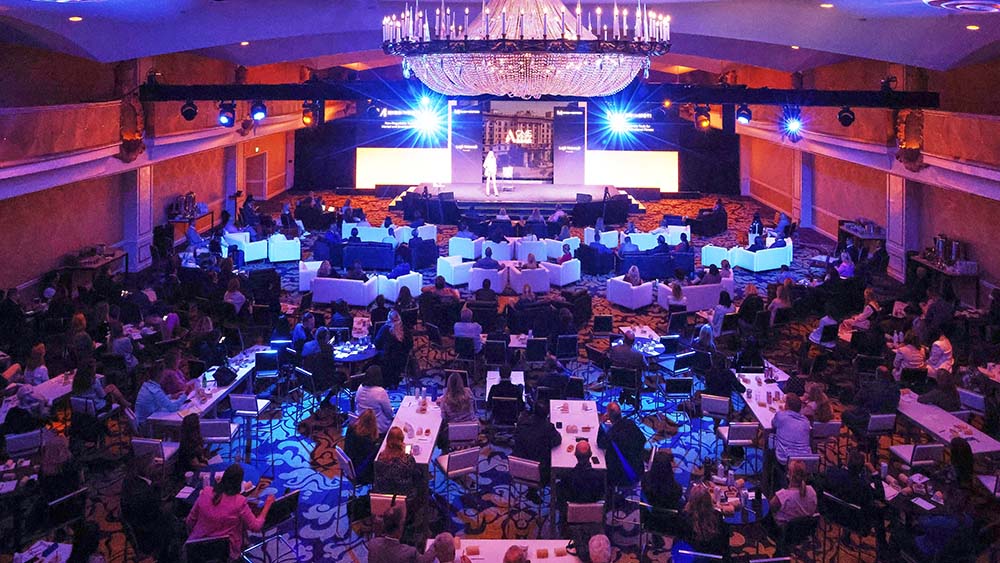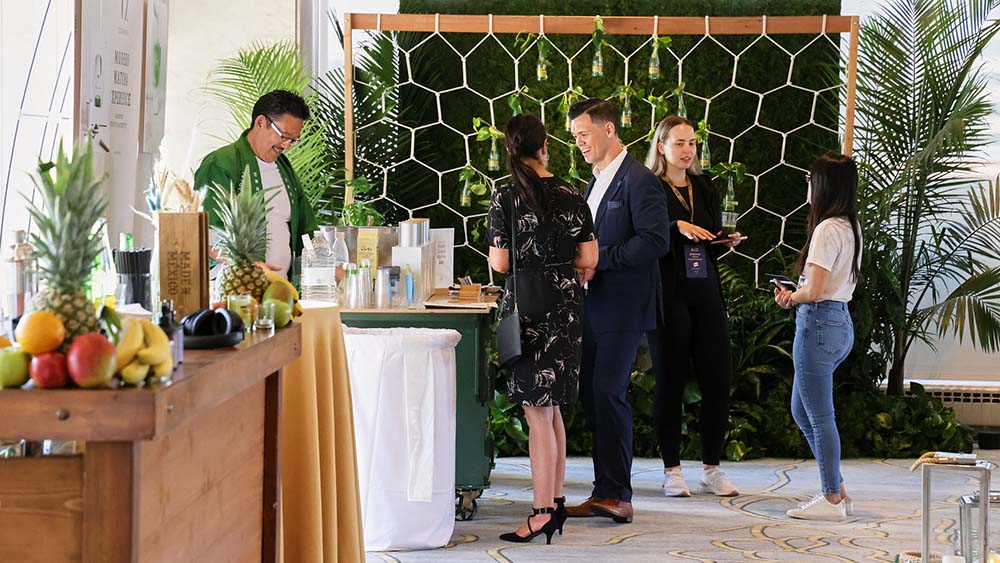
Accor’s annual Global Meeting Exchange returned in 2022, held at the Fairmont San Francisco, at the top of one of the city’s famous hills.
There was much that felt familiar when the Global Meeting Exchange (GME), hosted by Accor Hotels, returned after a two-year pandemic-related pause. GME 2022, held at the Fairmont San Francisco July 18–21, launched with a welcome party in the hotel’s opulent marble-pillared lobby, which buzzed with the sounds of people happy to be back in the swing of the reception balancing act, juggling plates of food, hugs, and glasses of champagne.
The conference annually brings sales representatives and executives from the Paris-based hotel chain together with their clients and the meetings industry press for education and networking. And over the next three days, plenary session speakers and hotel executives shared the signs that the hotel industry overall, and group travel specifically, is getting back in the swing — with some juggling also required.
Room night occupancy around the world, except for APAC, is now higher than what it was in 2019, said Jan Freitag, national director of hospitality analytics at CoStar, during a plenary session talk about the state of the industry. And at Accor, the largest hotel chain in Europe and the second-largest luxury hotel brand in the U.S., North American group and events business has rebounded to 67 percent of 2019 levels, said Jeff Doane, Accor’s chief commercial officer. But, as speakers and industry experts made clear, the world of meetings and events has been reshuffled by the pandemic in ways that are still shaking out.
“The total cost of travel suddenly is a huge topic,” Freitag said. “Prices are going way up and that definitely affects travel budgets.” With construction slowed on new hotels and fewer in the pipeline, “competition for existing hotels is heating up,” he said. Meanwhile, the hotel industry is still missing 300,000 of the hospitality staff lost during the pandemic, “and although wages have gone up 10 percent,” he said, those employees are not coming back.
Among other trends that speakers and Accor executives noted at the conference:
Sustainability is no Longer an Option
It used to be something nice to have, but it wasn’t at the core of what a company does. That’s no longer the case, said Brune Poirson, who joined Accor in May 2021 as chief sustainability officer. “It’s that it’s not about doing small things. It’s really about deep, meaningful changes to everything,” including operations, management, and financing, she said. It is something that Accor believes is important, but it’s also what stakeholders now expect, she added, including investors, government regulatory agencies, and guests, she said.
This year, Accor committed to removing all single-use plastic items in guest and meeting rooms in its more than 5,000 hotels by the end of 2022 — evidenced by sanitized reusable water bottles provided to us during the event in Fairmont’s guest rooms for refilling in the lobby. The hotel chain has started a “strong, strong push on food and beverage because that’s where a lot of our impact on the environment comes,” she said. “We want to focus massively on reducing food waste, changing the way we source products.” Accor also has instituted a sustainability training program for every employee — “believe me, it’s a lot of work,” Poirson said — which includes five mandatory modules.
Work has Changed Business Travel
People are changing, “not just in how they’re behaving, but in how they’re living their lives,” said Scot Hornick, a partner at management consulting firm Oliver Wyman, which has conducted research into global consumer trends and their impact on travel. Nearly 85 percent of white-collar workers said they would rather quit their jobs than go into the office five days a week, Hornick told a plenary session audience. “They expect way more fluidity in their spaces and the ability to both work and play in the same place.”
The remote working trend has changed hotel booking patterns, as travelers combine work and leisure, Freitag said. “Thursday used to be the big check-out day at hotels. Now it’s the big check-in day.” Travelers arrive on Thursdays, work part-time on Fridays, and then make it a long weekend, “maybe all the way through Monday because we don’t have to be in the office anymore,” he said.
Freitag remains bullish on business travel, “partially because we have to build culture,” he said. “If we aren’t going to meet around the water cooler, we are going to meet in a ballroom. And secondarily, I think that association events, large-scale citywide events, are a very efficient way for me to go and meet my clients, my partners, my competitors, when they’re all in the same city.”

At GME 2022, an immersive wellness lounge offered healthy refreshment, napping stations, and massages, along with samples of products used in Accor hotel spas around the world.
Meeting Attendees are Choosier
During his firm’s research into global trends travel, when consumers were asked about business conferences, 45 percent of respondents wanted to have more authentic interactions in networking events, Hornick said. “They are putting less importance on achievement and more on belonging.” Their research showed, too, that conference attendees have unmet needs — “for connection, and to make learning fun as part of the major drivers of what they’re seeking when they’re doing conference travel. Increasingly,” he said, “your attendees are going to be more leisure travelers.”
People understand they do not always need to attend meetings, said Meenaz Diamond, Accor’s senior vice president for sales worldwide. “The value proposition has to be correct and there also has to be a leisure component.”
The imperative that there be a leisure component to a business event was reflected in real time at GME 2022. The Fairmont San Francisco sits atop Nob Hill, and meeting participants streamed out from the hotel in all directions during the final afternoon of the conference. Some headed north to Fairmont Sonoma Mission Inn for wine tasting and relaxation at the hotel’s spa; others bicycled across the Golden Gate bridge; and some soaked up sunshine and the views while sailing on the Bay, or took a walking tour of the city’s historic Castro district, one of the first LGBTQ neighborhoods in the U.S.
A closing party on the final night blended the elegance of the historic 1907 hotel and San Francisco’s colorful cultural history: a Haight-Ashbury-style “Summer of Love” celebration, featuring a VW bus and love beads, hosted in the glow of the Fairmont’s gilded Venetian Room, where Tony Bennett first sang “I Left My Heart in San Francisco.”
Barbara Palmer is deputy editor of Convene.
Accor paid for all expenses for attending GME 2022 in San Francisco, including hotel accommodations and travel.
